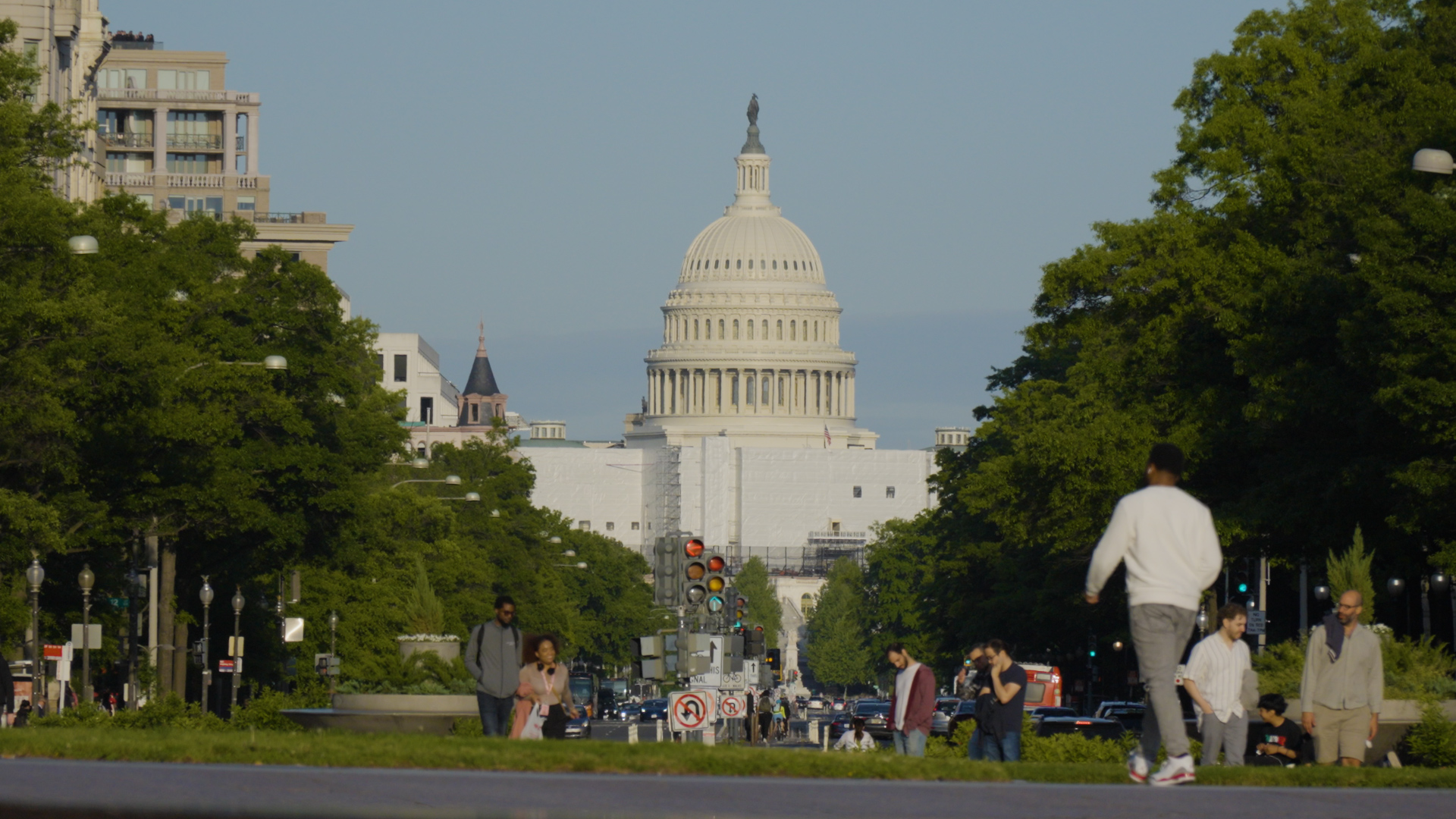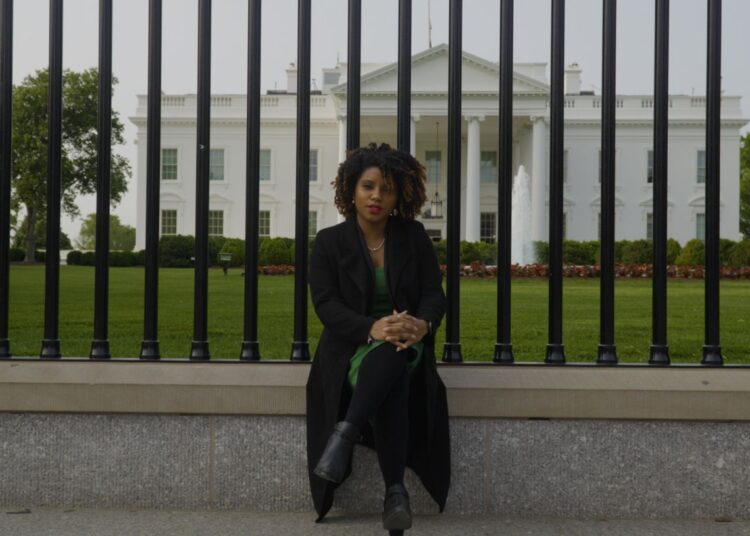On the same day that the corruption trial will begin against Senator Bob Menéndez, Belly of the Beast will premiere on YouTube Hardliner on the Hudson, on May 13.
It is a documentary produced by the platform, whose filmmakers, represented before the cameras by Cuban journalist Liz Oliva, try to make the Democratic Senator ― then president of the powerful Senate Foreign Relations Committee ― argue his obsessive crusade against Cuba.
Menéndez, who was not born on the island but in New York in 1954, escaped Oliva’s requests by not giving a straight answer through the corridors of the Capitol or on the street itself.
For this, he used one of his cronies: his press assistant.
Reed, an event explorer
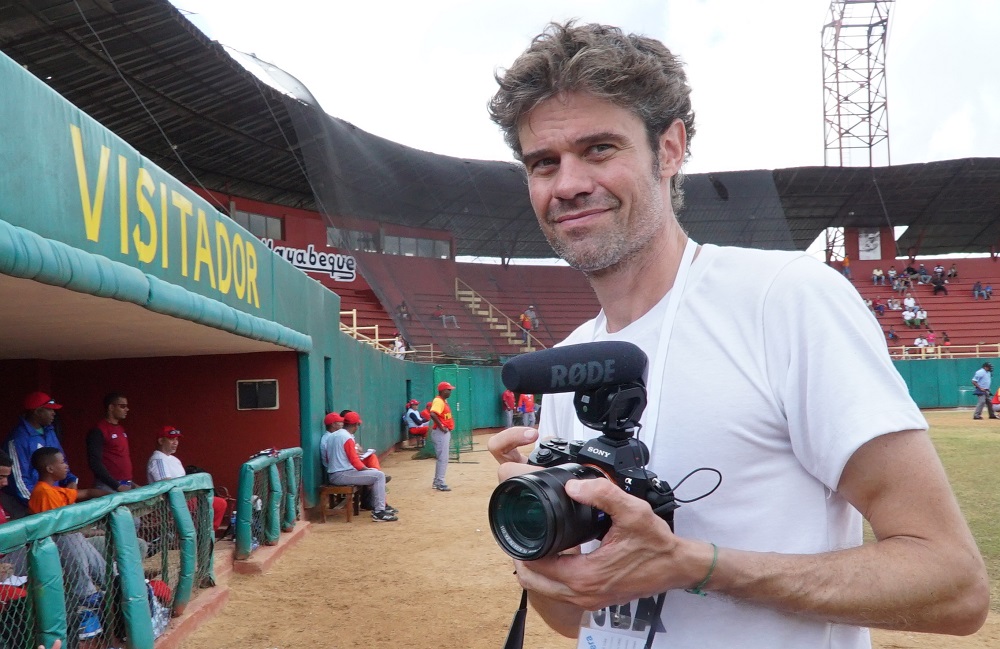
“Liz Oliva was able, at least, to speak a little with Bob Menéndez, although in the end, he did not give the interview. That was the most difficult part because they didn’t want to talk. From the Biden administration we did not get any interview, unfortunately,” Reed Lindsay (New York, 1975) told OnCuba.
Lindsay, an independent journalist and filmmaker who has covered dangerous crises in Egypt and Haiti, among others, presented in pre-premiere the documentaries directed by him Hardliner on the Hudson and Uphill on the Hill at the headquarters of the Cinematheque of Cuba, in Havana.
Both materials were seen in a crowded room by a diverse group of people who had arrived on the island for the May 1 celebrations. In addition to a majority of Americans and Cubans, people from Germany, Canada, Ireland, South Africa, Chile, and Peru, among other nations, many of them wearing Kufiyahs in solidarity with Palestine.
For many, the embargo/blockade against Cuba issue is part of their militant agendas; for others, it could be a novelty to know how the United States applies sanctions using inconsistent pretexts.
That punitive agenda, which has not been able to oust the political system on the island, but does condition to a great extent its twisted development, goes from the Cold War to the present, more than sixty years. It has harmed millions of Cubans, both on and off the island.
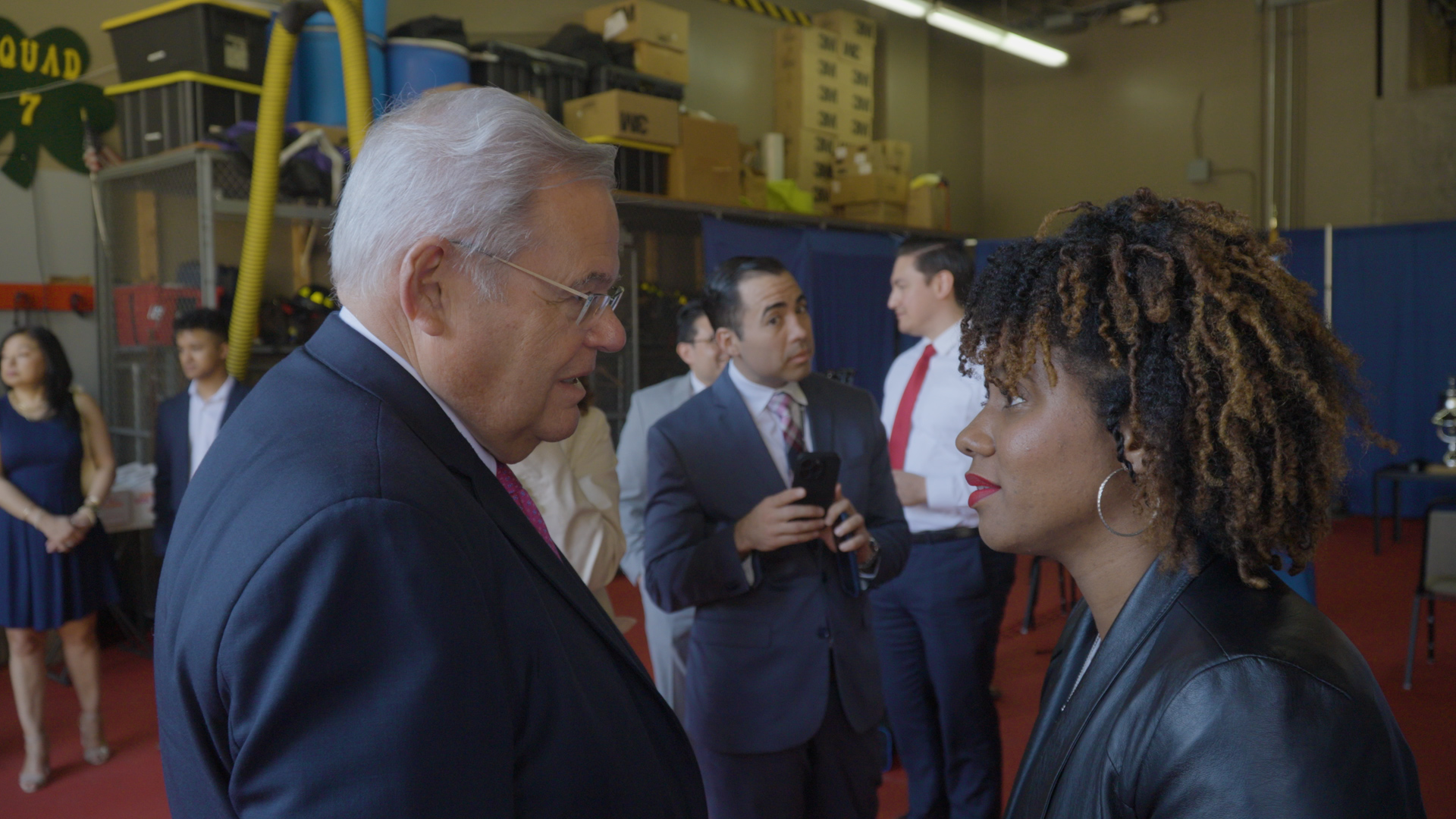
Why focus on Senator Menéndez? “When we started four years ago, Trump was president,” says Lindsay, “and we were covering the intensification of sanctions. We made a series called The War against Cuba, and when Biden was elected, we thought that perhaps there was no need to make another series of the war against Cuba, because Biden was the president.
“But things changed little.… The war against Cuba continued under Biden. During Trump, Cuban American politicians, and Republicans, such as Marco Rubio, influenced the administration. Mauricio Claver-Carone also had a lot of influence on Trump’s Cuba policy, and, suddenly, the same policy continues. So the question is why.”
And did you find out why?
We tried to get to an answer by questioning people with influences, with contacts, analysts, insiders, and everyone had a different opinion: some say it is the Florida factor; others, that it’s that Cold War mentality, of Biden himself; some, that it was Ron Klain, Biden’s Chief of Staff, who had worked in Gore’s campaign and who, they say, was traumatized when he lost in that extra counting in Florida against Bush Jr.
Some opinions claim that what they simply want is that Cuba collapses, but other people insist that Bob Menéndez is the most influential person in the administration.
“I have to talk to you about Cuba”
Hardliner on the Hudson did not miss an improvised scene and captured by dozens of cameras, and that in its time caught the attention of numerous media.
“Bob, I have to talk to you about Cuba,” said Biden smiling, almost ironic. “Okay,” Menéndez replied. “Seriously,” said Biden, before shaking the hands of other members of Congress gathered around him.
The brief exchange happened in February 2023, after the President’s State of the Union speech and raised, at that time, a wave of speculations about what the White House could be cooking up to rethink its Cuba policies.
Shortly afterwards the expectations were deflated. There were just some changes, but no political or economic significance.
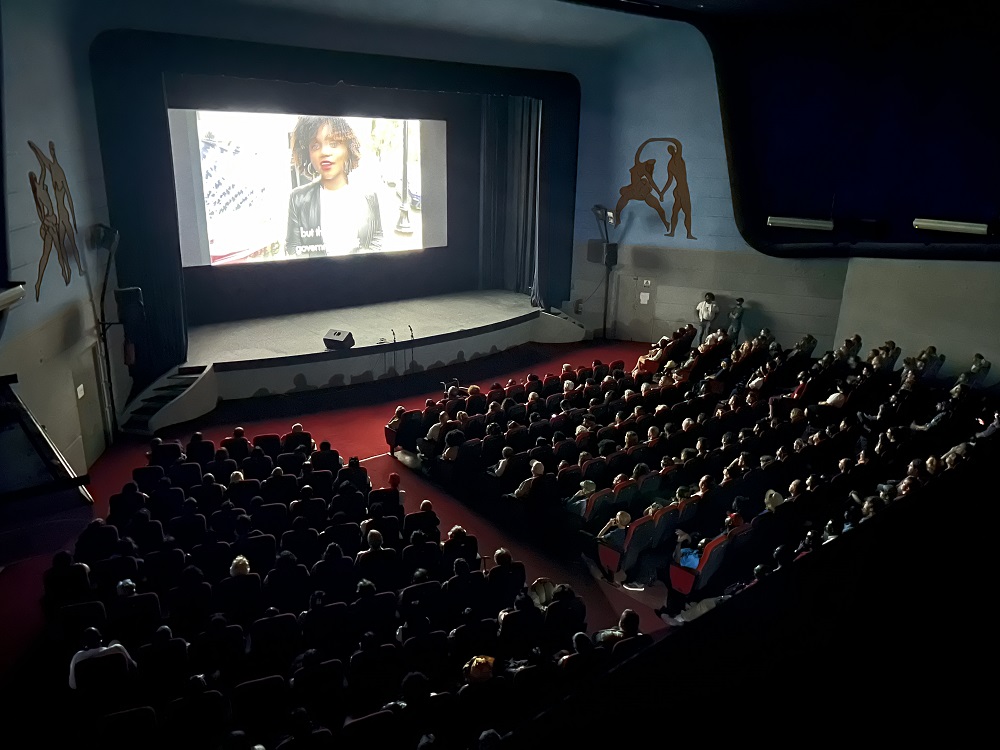
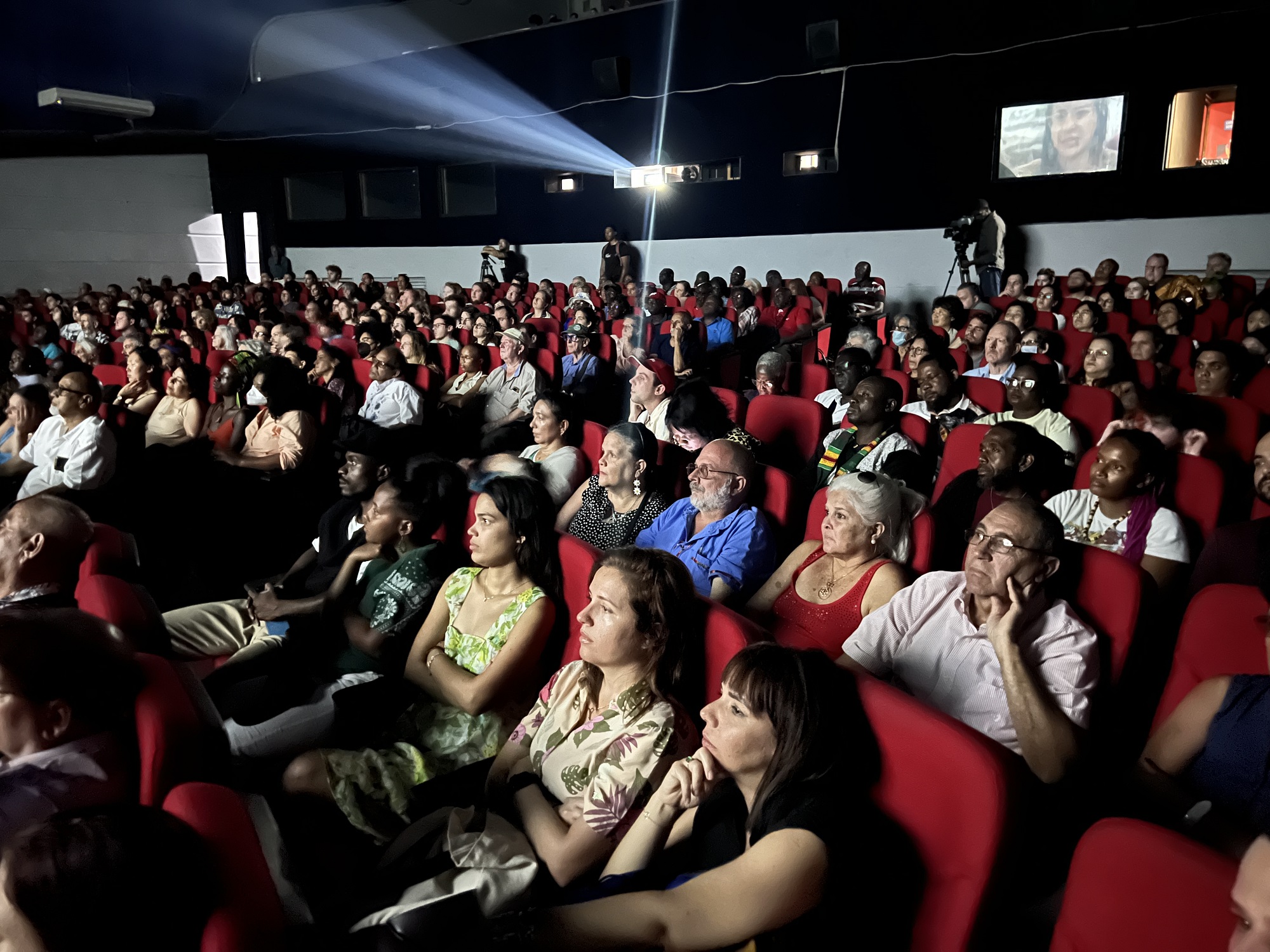
The Belly of the Beast team thought that Menéndez, a skillful politician with a meteoric career who became the first Latino to represent New Jersey in the Upper House, was the person with the most influence regarding Cuba in the Biden administration.
According to Lindsay, in the Democratic government there is no Claver-Carone, who served as an ideologist during Trump as an advisor in the redesign of punishment policies towards the island to erase, if possible, the advances achieved in the Obama era.
“We had to establish who was the person who was directing the Cuba policy and, although it was not entirely clear, many pointed out Menéndez and that is why we focused on him,” Lindsay explained.
And why didn’t the team go to Miami? It is impossible to narrate the story of Cuba without Miami and vice versa… It is a symbiosis, for better or worse.
We wanted, but we lacked time. I think that if we had worked on this during Trump, we would not have gone to New Jersey, but Miami. In fact, we had many ideas that we could have carried out in Miami, but it was not easy. It is a matter of resources, of time…. We focused on what seemed most important.
Lindsay’s documentaries were not all rosy. The first obstacle to overcome was to obtain a visa for journalist Liz Oliva.
“Precisely because of the intensification of sanctions with Trump, it was more complicated and, for example, the consulate in Havana was not giving visas. That was a long process,” says the freelancer.
The second difficulty was to get interlocutors in Washington and New Jersey. The team ruled out the idea that Liz interview certain analysts or make random street polls, although the second did happen in the Federal Capital with black citizens.
“The idea was that she have the opportunity, and that’s what she wanted, to interview politicians and officials who are making political decisions in the Biden administration. That could not be,” Lindsay laments.
Instead, Liz interviewed one of the congressmen who has most whipped Biden’s Cuba policy, Democratic Congressman James McGovern.
The representative for Massachusetts has been a decisive will in the mobilization of funds to repair Finca Vigía and conserve writer Ernest Hemingway’s papers, among other contributions to bilateral relations, which he has contributed by forming part of delegations to Cuba more than once.
Likewise, the team was able to get the confessions of Carlos Gutiérrez, former Secretary of Commerce during the Bush Jr. administration, who lost many friends in Miami because of his approach to Cuba, a country in which he was born in 1953.
In an exciting set of tensions, Liz also dialogued with former Democratic Congressman Albio Sira (Bejucal, 1951), who in the end was surpassed by the sagacity of the interviewer who did not let herself be provoked by the anger of the politician of Cuban origin.

What sponsors support Belly of the Beast?
We receive donations through a sponsor, which is the Center for Independent Documentary. Thanks to people who appreciate our work and donate money, we have been able to do the job.
It’s easy to imagine that budgets are not enough for…
We work with a minimum budget for the type of work we do. I am very proud because we have no connection with any state or any government, we do not receive money from any authority, or any multinational corporation or company.
You’re independent then
We are one hundred percent independent because when we decide to work on a topic, we debate it as a team and make the decision; there is no one to tell us or influence us to cover one issue or another. We do what seems important to us, which can have an impact and journalistic value.
You have a vast experience in crisis scenarios. Egypt, Haiti, Venezuela, where do you place Cuba?
I have worked in countries with a lot of instability and violent conflicts. In Cuba, it is another type of war. It’s incredible the number of people who ask me: “But is Cuba dangerous?” “Dangerous? It’s safer than the United States,” I answer.
Now, as a journalist, my time to be in conflicts and violence, risking my life has already passed. But it does not mean that there is no war here. Only it is of another type, as I said. Journalists are always looking for the precise word to describe U.S. Cuba policy: sanctions, embargo, blockade? Which is better? And our option was to talk about The War against Cuba.
When I chose the name, some in the United States said: “Don’t put that; they will think you are very radical”; that if it was very ideological, that “war” is a very “strong” word. Then I looked for the definition of “economic war” on Google and, when you think about the Cuban case, it is exact. It is an economic war. What happens is that normally the media does not call it by that name.
I think it is important to start calling things by their name, because, in addition, it is not a conflict of two sides, it is one-sided: from one side to another.

What is the immediate future of these materials?
The documentaries will be released this month on the Internet and can be seen for free. This work is not for film festivals; although we may participate in some. They are made to be distributed on social media, on YouTube… Our strategy is that they reach a wide audience.
The documentary about Bob Menéndez will be online on May 13, to coincide with the beginning of his trial; and the Uphill on the Hill on May 20.
At what level does Belly of the Beast want to rank in media competition?
I don’t know. We have advanced a lot in four years, and we want to have even more impact. It is a big challenge because I feel that we are producing very high-level material, in journalistic and visual terms. In fact, I feel that the quality of our work is up to any large media in the United States. The challenge is how to get to a similar audience, with very low resources.
Lee, the shipowner
Lee Schlenker is a young Bostonian of splendid mood. That is one of the sine-qua-non virtues for a job like his: producer.
He agrees to the interview with OnCuba in the middle of the bustle of the guests, the effusiveness of the encounters and greetings, and the soundtrack itself that Belly…has arranged for the occasion: a full volume funky, with DJ effects, which makes the feet of more than one move and also swallows the conversation of many.
Schlenker just left his position on the platform to work for ACERE, the Alliance for Cuba Engagement and Respect, as a policy director; but he was the producer of the documentaries about the island that the production platform has made.
“We began filming these documentaries as of April 2023 and we finished filming more or less in June; so it was six weeks, and all this year we worked on postproduction, edition, sound, music,” he says.
What was your action route?
I traveled to Miami, I had to establish many contacts in the spheres of power in Washington, and in the New York area and New Jersey.
What was the purpose?
The idea was to go behind the economic and political interests that manage and control in a certain way the decision of the Biden administration to maintain the Cuba policy he inherited from the previous administration.
Lee Schlenker and Liz Oliva in the presentation at the Cinemateca de Cuba, April 30, 2024. Photo: Ángel Marqués Dolz.
A candidate for a Master in Latin American Studies at the Walsh School of Foreign Service of the University of Georgetown and a graduate of Latin American and Urban Studies of Middlebury College, the young researcher and bilingual journalist said that the objective of the materials is to present, with a fresh language for young people, the tangible impact of U.S. sanctions against Cuba.
“I know that it is a historical, geopolitical subject, of more than six decades; but we wanted to take it to today,” Schlenker emphasized.
The team spent a couple of weeks in New Jersey, trying to hunt for the elusive Menéndez and also interviewing members of the Cuban American community based in the city; after Miami and Texas, the one with the most emigrants and their Cuban descendants in the American Union.
“Many of them do not feel defended or represented by their congresspeople,” said the producer.
For the second documentary, Uphill on the Hill, the team remained for a couple of weeks in Washington D.C.
The scenes in the Capitol are a novelty for the Cuban public. It is the first time that a journalist based on the island manages with ease through its corridors and offices; she even attended a press office of the State Department and ridicules Vendant Patel, its spokesman.
“We wrote to the entire staff of Senator Marco Rubio and the three Cuban American congresspeople in the lower house: Maria Elvira Salazar, Mario Diaz-Balart and Carlos Giménez. But they didn’t want any contact with us. There are scenes of Liz knocking on the doors of their offices in Congress,” said Lee.
“They spend all the time saying bad things about Cuba to the press, but talk to a Cuban journalist critical of the sanctions? Are you crazy?” says Liz herself before the camera in one of the congressional corridors after being cold-shouldered.
The former correspondent and former producer of Belly of the Beast had under his responsibility to harmonize a marathon tour of the journalist between October and November 2023 to explain to the audience the effects of the sanctions on Cuba.
The journey included about 70 events in 15 states and 40 U.S. cities, organized by unions, churches, community centers, and Washington for congressional staffers.
Liz, a star without dressing room
Liz Oliva Fernández, Cuban journalist of Belly of the Beast. Photo: Ángel Marqués Dolz.
“This girl has presence,” says the correspondent in Cuba of the Japanese newspaper The Yomiuri Shimbun seeing her in a verbal duel with former hardline Congressman Albio Sires.
Without a doubt, Liz Oliva steals the show. She is agile, friendly, convincing, fluently bilingual, and all the time maintains control of the situation.
On her side B, she is vulnerable and overwhelmed by circumstances and frustrations, and appears on camera, without makeup touch-ups, showing drops of sweat on her cheeks. In two words, she is a reporter ready for a call to action and part of her authenticity is due to not having dressing rooms.
Departure from the Faculty of Communication of the University of Havana, Liz, 29, is an exception to the stiff style of the official media.
How did you handle yourself emotionally in a stressful scenario like the United States?
It was difficult, especially since no one is prepared for that. Here in Cuba, journalism is very complacent, you don’t have to confront anyone, or ask difficult questions.
Your biggest stone on the road?
Language. What added the most stress was the English. I had to be in confrontational situations speaking a language that was not mine, but their territory. Also, it is very easy to dismiss you for any technicality if you do not master the language.
What did you try to do?
To be accurate, use the right words so that they could not reject what I was asking or saying, but it is difficult. I think that at the end of everything, what you have left is the satisfaction of having done everything you could.
How were the expectations you had in Cuba modified, once on the ground in the United States? Did you have to change plans a lot?
Actually, I had low expectations. I think that in the end, I felt a little frustrated, more for those who did not face me because they did not agree to give interviews, and I wondered how it is possible, am I not in the country of freedom of expression, what is happening?
However, people on the street, in Washington, D.C., proved to have a level of knowledge of the U.S. Cuba policy; especially because of their experience as black people in the United States, they understand much better what the government of their country is capable of doing.
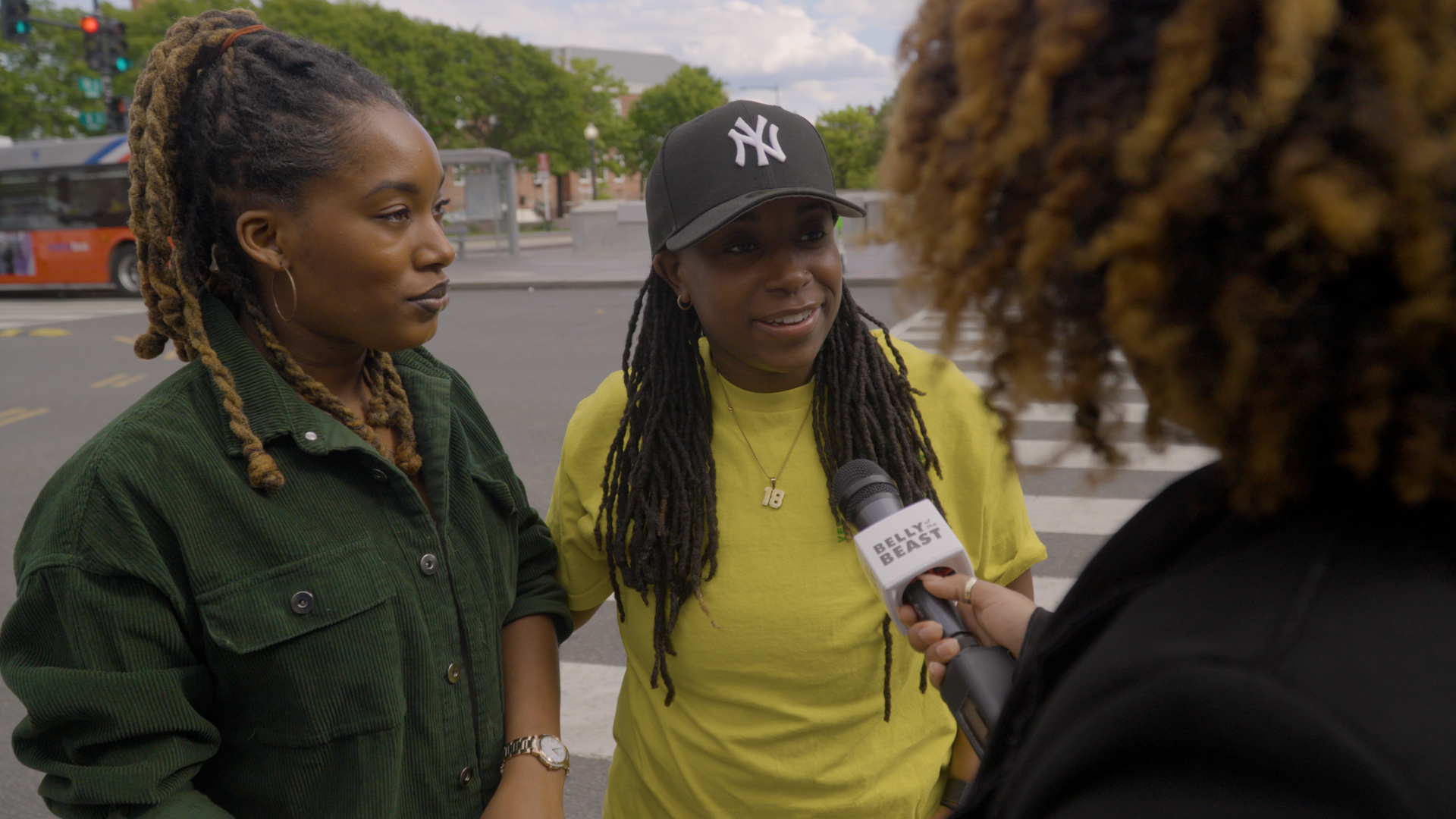
Was it your first time in the United States?
That’s right, and that was overwhelming in every way. In addition, doing so much in such a short time, with a limited visa.
And what did you learn about the sanctions?
They are an omnipresent monster that has no face, that has no name, that affects each of us, but differently.
Why?
Because it depends on the ethnic group to which you belong; the social status; where you live; if you are from the countryside, or the city; if you are from Havana, Miramar or San Miguel del Padrón; if you have family in the United States; if you have family reunification; remittances. Many factors affect, but definitely, the sanctions determine the life of the Cubans on the island and, as I said in the documentary, we have no agency on that.
What will be your next professional step?
To rest. (Laughs) It was really an exhausting experience. That is clear to the spectator of these documentaries….
I think we must pause these two works that required a lot of time, energy, and effort from the entire team behind the filming. Sometimes there were 18 hours of filming, in a day, constantly moving, in contexts that were totally alien to me.
